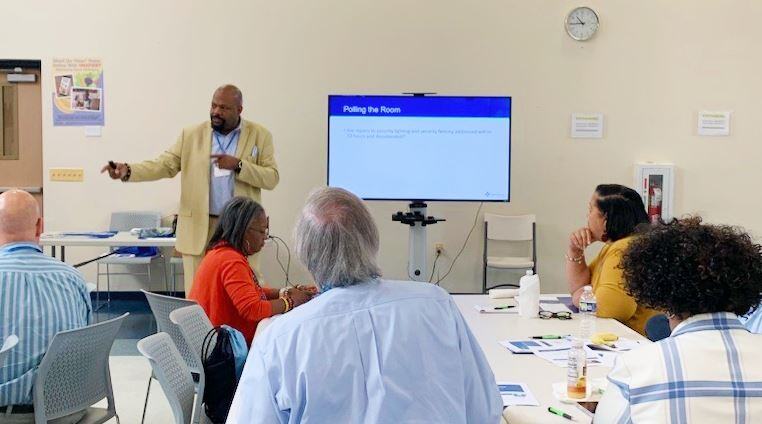As housing organizations increasingly recognize the importance of providing essential healthcare services to their residents, onsite mobile health clinics are becoming more common.
To efficiently deliver these services, housing organizations often contract with visiting nurses who provide care in the community instead of in a clinic or hospital setting. Housing residents also have the option to hire visiting nurses directly for personal care.
In either scenario, there's a need to navigate various legal liabilities and considerations to protect the interests of housing organizations and their residents.
This blog outlines the potential risks of partnering with visiting nurses, and the precautions housing organizations should take regarding visiting nurses hired directly by residents for care.
Legal considerations when partnering with visiting nurses
1. Medical malpractice claims
One of the primary legal concerns housing authorities face regarding visiting nurses is the potential for medical malpractice claims.
While visiting nurses play a pivotal role in ensuring the well-being of residents, any negligence or improper care could lead to legal repercussions. Housing organizations must exercise due diligence by ensuring visiting nurses maintain proper credentials, licenses, and liability insurance coverage.
To mitigate legal liabilities, housing organizations should seek additional insured status on relevant liability insurance policies and establish contracts with visiting nurse agencies or individual nurses. Contracts should:
- clearly outline the roles and responsibilities of parties involved and the services to be provided by the nurses;
- address how quality control and nurse oversight are managed; and
- include provisions addressing indemnification, insurance requirements, and dispute resolution mechanisms to safeguard the interests of the housing organization and, whenever possible, to transfer the risk contractually.
2. Healthcare regulations and privacy laws
Another concern is ensuring compliance with healthcare regulations and privacy laws. Housing organizations must familiarize themselves with relevant federal, state, and local laws governing healthcare services, records retention, and patient confidentiality.
Adhering to such laws as the Health and Insurance Portability and Accountability Act (HIPPA) is essential to protect the privacy and security of residents' health information.
3. Premises liability
Housing organizations must also consider premises liability, which is the legal responsibility that property owners or occupiers have for accidents and injuries that occur on their premises.
Health clinics established within housing complexes present a new level of responsibility for housing agencies regarding the relationship between the agency and the visiting nurses. It's important to correctly classify visiting nurses as employees or independent contractors, as misclassification could lead to employment-related disputes and liabilities, including wage claims, benefits disputes, and tax implications.
Best practices for managing nurses hired by housing residents

When housing organizations have visiting nurses hired directly by residents for care, there are several important precautions they should consider to ensure the safety and well-being of all residents and staff. Here are some recommendations:
Verification and documentation:
- Require documentation of the nurse's qualifications, certifications, and licensure.
- Maintain a record of the nurse's contact information, schedule, and the specific care services they will be providing.
- Ensure that the arrangement between the resident and the visiting nurse complies with any relevant local, state, and federal regulations.
Background checks:
- Conduct thorough background checks on visiting nurses to ensure they do not have a history of criminal activity or misconduct that could pose a risk to residents.
Insurance and liability:
- Require visiting nurses or the agency they're employed with to carry their own professional liability insurance to cover any potential accidents or incidents that may occur while providing care.
- Request additional insured status on any relevant insurance policies.
Communication:
- Establish clear lines of communication between the visiting nurse, the resident, and the housing organization.
- Provide a point of contact within the housing organization for the visiting nurse to reach out to in case of emergencies or concerns.
Training and orientation:
- Offer orientation sessions for visiting nurses to familiarize them with the layout of the housing complex, emergency procedures, and any specific policies or rules of the organization.
Privacy and confidentiality:
- Emphasize the importance of maintaining residents' privacy and confidentiality, especially when dealing with medical information.
Emergencies:
- Establish a clear plan for responding to medical emergencies, including communication with emergency services and coordination with the resident's healthcare provider.
Dispute resolution:
- Establish a process for resolving disputes or conflicts between residents and visiting nurses.
Regular review:
- Periodically review and assess the effectiveness of the precautions and protocols in place, and make necessary adjustments based on feedback and experience.
Bottom line: Work with legal counsel to mitigate legal liabilities
To successfully navigate the legal complexities involving visiting nurses, housing organizations should seek the guidance of legal counsel. Attorneys specializing in healthcare and housing law can provide advice, review contractual language, and ensure compliance with applicable laws and regulations.
By proactively managing potential risks through careful planning, clear contracts, compliance, and professional legal counsel, housing organizations can protect themselves and continue facilitating essential healthcare services for their residents with confidence.
HAI Group members: Contact your dedicated risk control consultant for more risk management tips and tools, or to set up a customized training session for your organization.
This article is for general information only. HAI Group makes no representation or warranty about the accuracy or applicability of this information for any particular use or circumstance. Your use of this information is at your own discretion and risk. HAI Group and any author or contributor identified herein assume no responsibility for your use of this information. You should consult with your attorney or subject matter advisor before adopting any risk management strategy or policy.






